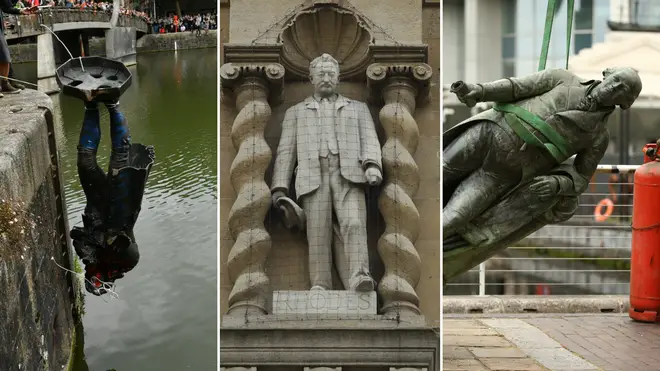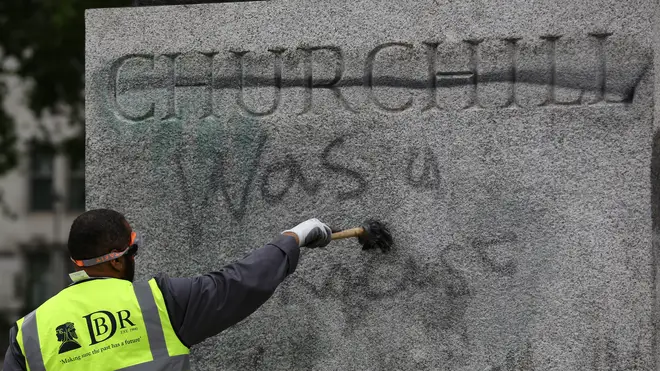
Ali Miraj 12pm - 3pm
12 June 2020, 18:25

British history won't be forgotten if statues of the people who helped shape it are removed, according to experts.
The statue of Edward Colston sat on a plinth for more than a century to celebrate his philanthropy, but was torn down last week when protesters were reminded he profited from the slave trade.
The statue of Robert Milligan, an 18th century slaver and key proponent in the creation of London's West India Docks, was removed earlier this week, inspiring action to put other statues under review.
The statue of Winston Churchill in Parliament Square is a permanent reminder of his achievement in saving this country – and the whole of Europe – from a fascist and racist tyranny. 1/8
— Boris Johnson #StayAlert (@BorisJohnson) June 12, 2020
Boris Johnson addressed the issue today, saying it was 'absurd and shameful' that authorities were forced to protect a statue of Winston Churchill from attacks, adding the UK 'cannot lie about its history' , and stressing it was not time to "edit or censor" the UK's past.
He argued that toppling monuments would be akin to pretending to have a "different history" that would "impoverish" the education for future generations.
READ MORE: Colston, Clive, Rhodes and Picton - the statues under fire for their troubled pasts
READ MORE: Banksy suggests what to do with the toppled Edward Colston statue
"They had different perspectives, different understandings of right and wrong," he said of the figures depicted by monuments.
"But those statues teach us about our past, with all its faults. To tear them down would be to lie about our history, and impoverish the education of generations to come."

Many historians, however, take issue with this argument and say memorialising a person - despite their clear failings - can send a misguided message about the country's values today.
"Acknowledging that individuals might have some positive aspects to their past does not mean that their involvement in terrible, violent acts, should be dismissed," British imperialist historian Rebecca Swartz told LBC News.
READ MORE: Calls revived to dump Oxford University statue of Cecil Rhodes
READ MORE: Members of the public scrub graffiti off Churchill statue - 'Defacing it is one step too far'
"The issue at stake here in memorialising figures like these is that it tends to erase these negative aspects, focusing instead on the positives.
"It is really important to think about why and who we memorialise and how they reflect our values as a society."
In fact, some have argued that taking these statues down could result in a willingness to look back over our colonial past - that some look upon as "the good old days" - and take into account what actually occurred.
Robbie Aitken, a senior lecturer in colonial history at Sheffield Hallam University, said repercussions were still being felt today from attitudes that celebrate the UK's "highly romanticised" version of a bloody history.
READ MORE: 'History has been made' - Bristolians react to toppling of Edward Colston statue
READ MORE: Boris Johnson urges BLM protesters to stay away from demonstrations this weekend
He added: "Britain’s colonial past (like its history of slavery) is present all around us in public spaces such as buildings, street names, and, of course statues.
"They serve as a constant reminder of this history.
"But their continued presence also speaks to a collective colonial amnesia/aphasia; an unwillingness to critically question this romanticised past, as well as the lives and events that they represent and the purpose that they serve."

'Racist' pub sign taken down in Ashbourne
According to Benoit Henriet, the assistant professor of global history at Brussels University, it is also important to remember what these towering statues communicate to the descendants of formerly colonised communities.
He said: "It is a daily remembrance that their home country has yet to critically assess its brutal colonial past."
Westminster University historian Itay Lotem said it was important to note that struggles against slavery, and criticism of the British Empire were also "rife" at the time many of these men were alive.
This means, he added, that "decisions to honour these men reflected conscious choices".
"In the context of Black Lives Matter, this makes these statues symbols of the long history of racism in Britain.
"If we are really committed to black dignity, challenging the power that these statues exert over public spaces is key.
"In many ways, these statues remind us of the contradictions of empire: much of what improved life in Britain was enabled and fuelled by violence elsewhere in the empire."
READ MORE: BLM protesters warned not to 'fall into trap' set by extreme far-right in London this weekend
READ MORE: Sadiq Khan forms diversity commission to review London landmarks
Mr Lotem later pointed out there are no particular sites of colonialist violence on British soil, meaning the statues are also a representation of the violence that was "sanitised in the form of important men and local philanthropy".
He added: "Putting these men on trial today would not help, as they are dead.
"The only thing we can do is to acknowledge that their actions still impact Britain and act accordingly."

Anti-racism protesters tear down controversial statue of slave trader in Bristol
Toppling statues in protest makes "an important symbolic commitment to building a different, more equal society in which these legacies can be dismantled," Ms Swartz said, and warned that statues were just the beginning of the debate.
Education, too, and change in attitudes toward our history would also be a start, according to Mr Lotem.
"Unlike France or Germany, the British political discourse rarely addresses any introspective kind of ‘memory’," he said.
"We talk about memory when we want to remember positive events, whether victories or the positive resistance of individuals [...]
"What is needed to understand empire is to find a way to face its violent and darker sides through new ways of addressing responsibility rather than unhelpful fights over its ‘good’ and ‘bad’ track record.
"It would mean creating monuments, museums, school curricula, memorial days and other modes of remembrance that acknowledge that British history is inseparable from the violence and racism of the imperial project."
READ MORE: 'Extreme far-right' don't need to come to London to protect statues
READ MORE: Stormzy pledges £10m to anti-racism and black empowerment groups
For Mr Henriet, demonstrations could have a "positive impact" by making it increasingly difficult to deny that racism exists in society and that it has links with a colonial past.
He added: "We must learn to listen to those affected by racism in their daily lives. They are the ones who know best how to tackle it.
"The voices of BAME have for too long been neglected. Now is the time to listen."